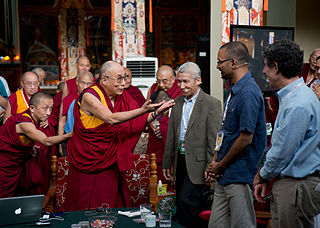A Quote by Sakyong Mipham
Meditation practice is relevant because in meditation our conceptual mind relaxes and we can feel who we are at heart.
Quote Topics
Related Quotes
Meditation means awareness. Whatsoever you do with awareness is meditation. Action is not the question, but the quality that you bring to your action. Walking can be a meditation if you walk alertly. Sitting can be a meditation if you sit alertly. Listening to the birds can be a meditation if you listen with awareness. Just listening to the inner noise of your mind can be a meditation if you remain alert and watchful. The whole point is: one should not move in sleep. Then whatsoever you do is meditation.
Meditation is the tongue of the soul and the language of our spirit; and our wandering thoughts in prayer are but the neglects of meditation and recessions from that duty; according as we neglect meditation, so are our prayers imperfect, - meditation being the soul of prayer and the intention of our spirit.


























